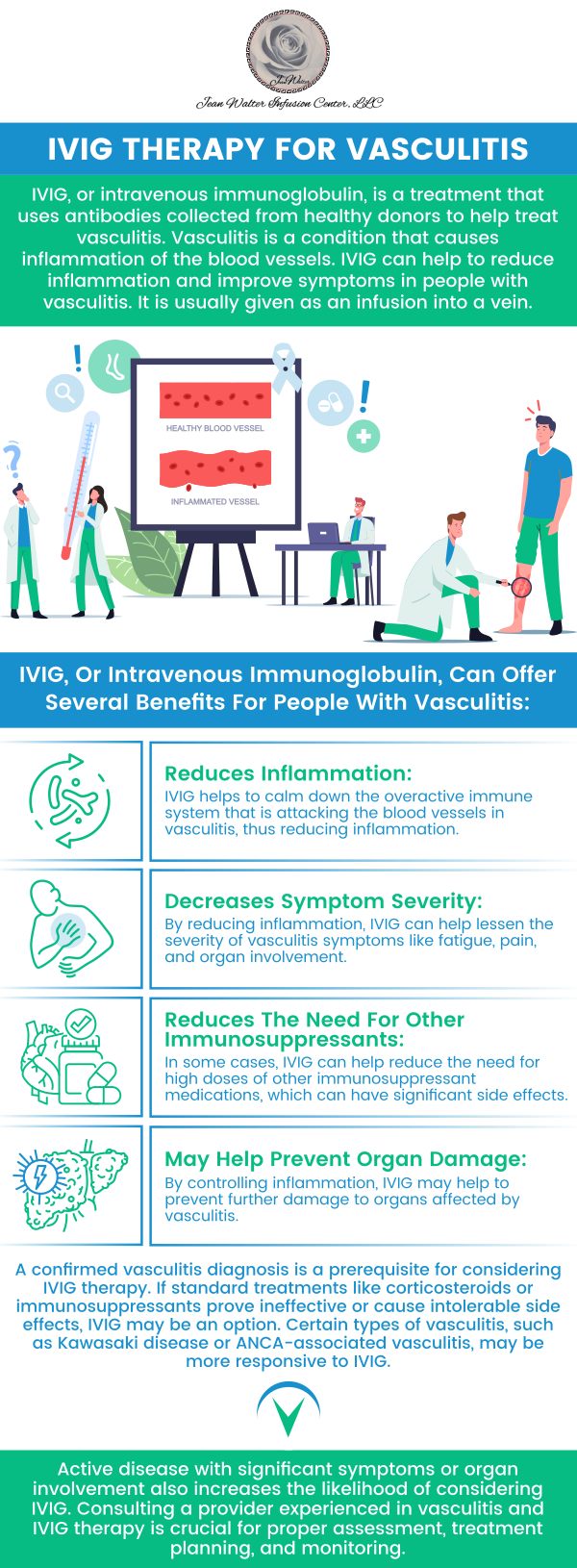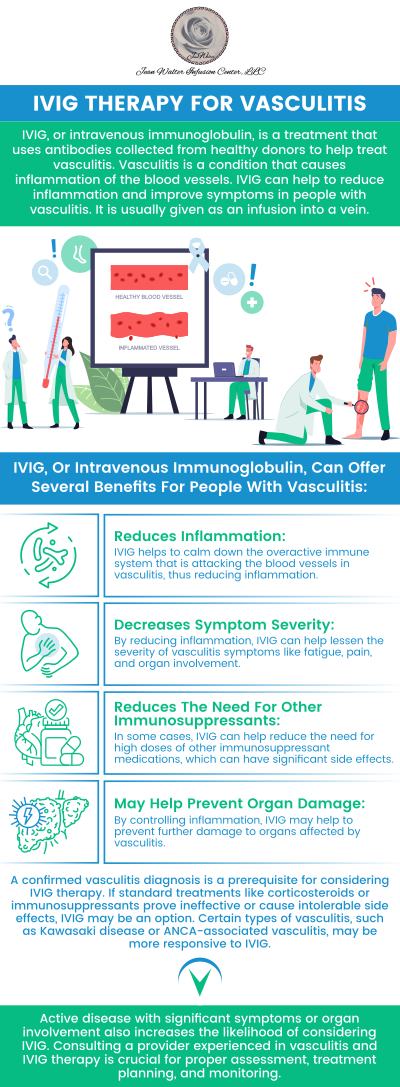How IVIG Helps Manage Vasculitis Effectively
IVIG effectively manages vasculitis by suppressing the overactive immune system. This reduces inflammation, alleviates symptoms, and prevents tissue damage. Dr. Nasser Nasseri, MD, and his team at Jean Walter Infusion Center provide personalized care, tailored treatment plans, and ongoing monitoring to ensure optimal outcomes. For more information, contact us or book an appointment online. We have convenient locations to serve you in Edgewater MD, Rosedale MD, North Baltimore MD, Columbia MD, Glen Burnie MD, and Catonsville MD.




Table of Contents:
Is IVIG effective for all types of vasculitis?
How often will I need IVIG treatments for vasculitis?
Can IVIG help prevent flare-ups of vasculitis?
Does IVIG therapy improve the quality of life for vasculitis patients?
How Does Dr. Nasser Nasseri, MD, Use IVIG to Manage Vasculitis Effectively?
One type of blood product made from the serum of thousands of donors is called intravenous immunoglobulin (IVIG) and is used to treat certain health conditions, including some types of vasculitis. However, its effectiveness varies.
For Kawasaki disease, typically found in children, IVIG is a standard initial treatment often paired with aspirin. If given during the first 10 days after the illness starts, it can effectively reduce the risk of coronary artery abnormalities.
In contrast, for granulomatosis with polyangiitis (GPA) and microscopic polyangiitis (MPA), vasculitis types that affect small-to-medium vessels, standard treatments are typically employed before considering IVIG. In cases where patients cannot tolerate standard treatments or have refractory disease, IVIG has shown some effectiveness, although more research is necessary to confirm its role in the treatment plan.
As for other types of vasculitis, such as Behçet’s disease, IVIG may be used as an adjunctive therapy, but again, to confirm its effectiveness, more research is necessary. Unfortunately, IVIG is not effective in treating other types of vasculitis, such as Polyarteritis Nodosa (PAN), Eosinophilic Granulomatosis with Polyangiitis (EGPA), and Takayasu’s arteritis.
We understand that the decision to use IVIG to treat vasculitis is complex and should involve a thorough discussion between the patient and the doctor. Factors such as the specific type of vasculitis, the patient’s overall health, and the potential risks and benefits of each treatment option need to be considered. While IVIG can help control symptoms and prevent complications, it’s important to remember it is not a cure for vasculitis. Our group is committed to providing individualized treatment, ensuring patients understand their treatment options and are part of the decision-making process.
We understand that the frequency and duration of IVIG treatments for vasculitis can significantly vary depending on the patient’s condition. Considering the severity of the illness and the patient’s response to therapy, each patient and our team of medical professionals collaborate closely to determine the best course of action.
Our center provides a comfortable and safe environment for patients undergoing monthly or biweekly infusions, which typically last from 2 to 4 hours each. We monitor each infusion closely and can adjust the intervals between these treatments based on the patient’s symptoms and the disease’s response to the treatment. We want the infusion procedure to be as comfortable and efficient as possible, enabling patients to concentrate on getting better.
For some patients, a single course of treatment may be sufficient, while others may require ongoing therapy for several months, years, or even indefinitely. We also offer IVIG as a maintenance therapy to prevent disease flares or relapses in patients with severe vasculitis.
Regular monitoring and follow-up appointments are key to successfully managing vasculitis and modifying the treatment plan as necessary. Lastly, while IVIG is an effective treatment for many people with vasculitis, it does come with potential side effects, like headaches, fever, and fatigue. Consequently, the decision to use IVIG is made in close consultation with our healthcare professionals, considering the potential benefits and risks. Our staff is available to help and mentor you during your recuperation process.
Several studies have demonstrated the benefits of IVIG in treating certain types of vasculitis, particularly when other treatments are not effective or cannot be used due to side effects. As an example, IVIG is the standard treatment for Kawasaki disease, a type of vasculitis that impacts kids. It has also been used successfully as a maintenance therapy in individuals with frequent or severe vasculitis flare-ups, reducing the risk of future episodes.
Although efficacy varies according to the type of vasculitis and the patient’s response, IVIG treatment can potentially delay the onset of a first flare-up in individuals at high risk for developing vasculitis. It is typically administered through regular infusions over several months or years, often in combination with other medications to manage the condition effectively.
When considering IVIG treatment, it’s important to understand the complexity of the treatment, its high cost, potential side effects such as fever, chills, headaches, or allergic reactions, and the fact that individual responses to IVIG can vary. Regular monitoring and follow-up with a healthcare professional such as our experienced team are essential to assess the benefits and risks of IVIG therapy.
We provide intravenous immunoglobulin (IVIG) therapy as one of our therapeutic choices, which has shown potential to improve the quality of life for vasculitis patients. This therapy involves administering high-dose antibodies, derived from the plasma of healthy blood donors, into the patient’s bloodstream via an IV drip. These antibodies can suppress the immune system and reduce inflammation, thus alleviating vasculitis symptoms.
Studies show that IVIG therapy can lead to significant improvements in vasculitis patients’ physical symptoms, such as pain, fatigue, and organ dysfunction. Additionally, it may enhance emotional health by reducing anxiety and depression—common symptoms among vasculitis patients. This improvement in physical and emotional well-being allows patients to participate more fully in social activities and engage in daily tasks, resulting in an overall enhancement of their standard of living.
Moreover, IVIG therapy may also decrease the need for corticosteroids, which are standard treatments for vasculitis but can cause side effects such as weight gain, mood swings, and weakened bones. Therefore, reducing reliance on these medications can further enhance the patient’s quality of life.
However, it’s important to note that the benefits of IVIG therapy can vary among individual patients, and it can have side effects including flu-like symptoms, a risk of blood clots, headaches, nausea, and, in rare cases, severe allergic reactions.
Vasculitis is a complex autoimmune condition characterized by inflammation of the blood vessels. At Jean Walter Infusion Center, led by skilled physicians like Dr. Nasser Nasseri, MD, the condition is treated using advanced therapeutic options, including Intravenous Immunoglobulin Therapy (IVIG).
IVIG is a potent, targeted infusion treatment offered by the center’s knowledgeable specialists. It works by delivering high doses of specialized immunoglobulins—concentrated antibodies—directly into your bloodstream. For Vasculitis, the IVIG acts to modulate and suppress the hyperactive immune system responsible for the blood vessel inflammation. This immune-regulating effect helps control disease activity, reduce damage to organs and tissues, and prevent severe flare-ups.
Dr. Nasseri and his team utilize cutting-edge technology to ensure that your IVIG therapy is administered safely and comfortably. By providing this high-quality, specialized care, Jean Walter Infusion Center offers patients with Vasculitis a powerful way to manage their symptoms and achieve a better quality of life.
Our goal is to provide treatments that enhance our patient’s quality of life and overall well-being. For more information, contact us or request an appointment online. We have convenient locations to serve you in Maryland. We serve patients from Catonsville MD, Rosedale MD, Columbia MD, Glen Burnie MD, Edgewater MD, North Baltimore MD, Parkville MD, Middle River MD, Dundalk MD, Halethrope MD, Ellicott City MD, Laurel MD, Hebbville MD, and Woodlawn MD, and the surrounding areas.
Check Out Our 5 Star Reviews

Additional Services We Offer


- Infusion Therapy
- Injection Treatments
- Intravenous Immunoglobulin Therapy
- Medical Conditions
- Asthma
- Crohn’s Disease
- Fibromyalgia
- Gout
- Inflammatory Eye Disease
- Inflammatory Skin Disease
- Iron Deficiency
- Lupus
- Multiple Sclerosis
- Myositis
- Osteoporosis
- Rheumatoid Arthritis
- Ulcerative Colitis
- Vasculitis
- PRP Injections






